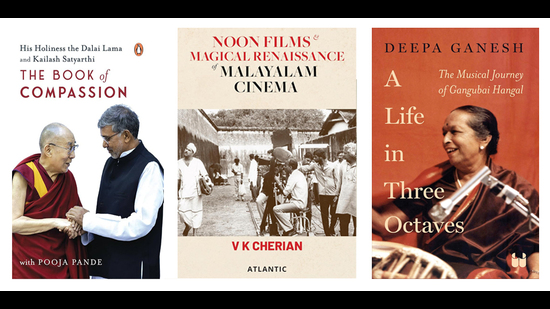HT Picks; New Reads
This week’s pick of interesting reads includes a book by two Nobel Peace Prize Laureates on the need for compassion, another on the filmmakers instrumental in the renaissance of Malayalam cinema in the 1970s and 1980s, and a volume on one of the greatest Hindustani classical music vocalists of India
A necessity if our species is to survive


Nobel Peace Prize Laureates, the Dalai Lama and Kailash Satyarthi, open a window to the concept of compassion, which, according to them, is undoubtedly the most significant requirement of our existence. “Compassion is no longer a luxury,” says the Dalai Lama. It is “a necessity if our species is to survive”. Kailash Satyarthi urges us all to consider a flight of compassion as it inspires everyone to free themselves from the shackles of limitations and explore the limitless possibilities of life.
They present the need to cultivate compassion and state that honest concern for others is the key factor in improving our day-to-day lives. From inequalities to injustice to climate change, the influence of Gandhi to ancient Indian and Tibetan knowledge systems, importance of education for children, and the idea of an interconnected world, among others, the two globally-renowned leaders discuss them all in The Book of Compassion. Theyreveal their vision for a globalized compassion that promotes freedom, joy and inner peace. Candid, anecdotal and absolutely unputdownable, this book is a source of courage and wisdom.*
Kerala’s transformative films of the 1970s and 80s

Malayalam cinema, celebrated for its outstanding accolades at the annual National Film Festivals, has carved a remarkable niche in the Indian film industry. The success story took flight with Adoor Gopalakrishnan’s critically acclaimed 1972 film, Swayamvaram. And this happened in Kerala, a Malayalam-speaking, 35 million-strong Indian state. Its tiny size notwithstanding, Malayalam films have not only dominated the national film landscape but have also garnered global recognition. Adoor Gopalakrishnan’s receipt of the Sutherland Trophy, awarded by the British Film Institute in 1982, serves as a notable testament to this fact. There is only one other Indian filmmaker who shares this distinction: Satyajit Ray.
A film professor in Japan, for instance, holds the view that the late Aravindan’s Kumamtty is among the greatest films ever created. Another significant luminary in Malayalam cinema is John Abraham, whose rebellious spirit and impactful films have profoundly influenced emerging filmmakers and passionate film enthusiasts. The collective efforts of these filmmakers, commonly known as the “A-Team”, were instrumental in the renaissance of Malayalam cinema during the 1970s and 1980s. Their contributions surpassed the realm of cinema, encompassing transformative reforms within the sector, including the advancement of gender equity.*
A voice extraordinaire

Gangubai Hangal is among the greatest Hindustani classical music vocalists of India. She was conferred with the Padma Vibhushan, given a state funeral, memorialized on a stamp and there are concerts in her memory to this day. Born in 1913 in Dharwad into a family with a rich musical tradition, young Gangu’s interest in music was piqued by many things, not least by the magical new technology that was the gramophone. But her life and her artistic journey truly began with she became a disciple of Sawai Gandharva at the age of 17. By taking refuge in her guru, Gangubai was able to distance herself from the devadasi community to which she belonged, and move on to the concert stage, radio and recording studios. In many ways, Gangubai’s life ran parallel to the journey of India itself. From being inspired by Mahatma Gandhi to being part of the changing landscape of Indian music, hers was a life poised between the riches of tradition and the promise of modernity. A Life in Three Octaves is an intimate warm hearted account of a remarkable human being and an extraordinary artiste.*
* All copy from book flap.






